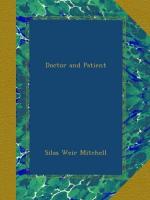I might go farther back in time, and show by examples that the great fathers of medicine have usually possessed a like capacity, and learned much from experience of that which, emphasized by larger use and explained by scientific knowledge, has found its way into the text-books of our own day and become common property.
It appears to me from a large mental survey of the gains of my profession, that the English have above all other races contributed the most towards enforcing the fact that on the whole dietetics, what a man shall eat and drink, and also how he shall live as to rest, exercise, and work, are more valuable than drugs, and do not exclude their use.[1]
[Footnote 1: By this I mean that the physician, if forced to choose between absolute control of the air, diet, exercise, work, and general habits of a patient, and use of drugs without these, would choose the former, and yet there are cases where this decision would be a death-warrant to the patient.]
The active physician has usually little time nowadays to give to the older books, but it is still a valuable lesson in common sense to read, not so much the generalizations as the cases of Whytt, Willis, Sydenham, and others. Nearer our own day, Sir John Forbes, Bigelow, and Flint taught us the great lesson that many diseases are self-limited, and need only the great physician, Time, and reasonable dietetic care to get well without other aid.
There is a popular belief that we have learned this from homoeopathy, for the homoeopath, without knowing it, made for us on this matter ample experiments, and was as confident he was giving powerful medicines as we are that he was giving practically none. “He builded better than he knew,” and certainly his results aided our ablest thinkers to reach the truth.




